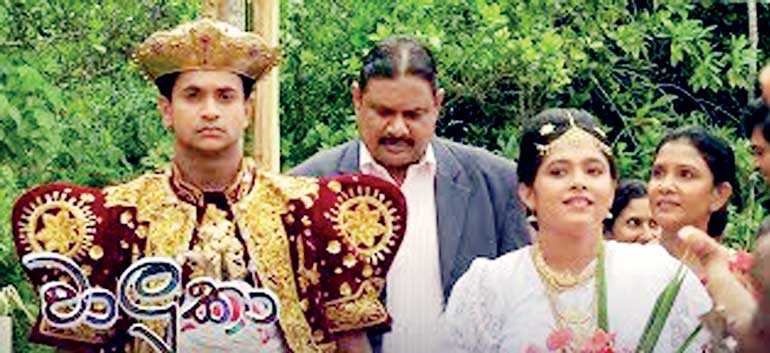Wednesday Feb 25, 2026
Wednesday Feb 25, 2026
Thursday, 21 June 2018 00:00 - - {{hitsCtrl.values.hits}}

There are several Sinhala teledramas telecast these days with passing political or social messages both constructive and humorous. The ongoing ‘Ape Ardare’ (Our Love) and ‘Sanda Eliya’ (Moonlight) may stand out, exposing the dubious nature of politicians, their business connections and thuggery.
Another positive aspect of some these teledramas is to challenge the ethnic and class or caste prejudices of our society. In ‘Ape Ardare’ the daughter of the Jayawardena family, Senuri, finally appears to be a Tamil girl adopted 20-odd years ago from a convent in Maravila. She is Sinhalese but Tamil!
Most of these teledramas are love stories made particularly for the young generations and all cannot be considered artistically valuable. None of them, so far as I have seen, also can be considered completely political in story or plot. This is important because we have enough political drama in real life in this serendipity island.
Waluka teledrama 
The ITN teledrama Waluka that I am referring to today is completely apolitical and there is not even an indirect political message or comment in the episodes so far telecast. By last Friday (15 June), 33 episodes had been telecast. One may then ask, why am I reviewing or commenting on these episodes without waiting for the whole drama to end. The reason is that although Waluka is not at all a political teledrama, the story so far unravelled quite by accident reveals what has actually happened in the Yahapalana political drama.
Waluka is a superb teledrama created by Nishula Deepa Thambawita (Director) and Rihan Ravindra (Screenplay) and produced by ARYAA. There are a good number of excellent actors and actresses among whom Janaka Premalal, Hasinika Karaliyadda, Deepani Silva, Srimal Wedisinghe, Chandika Nanayakkara and Kamal Deshapriya are prominent. There are several others of the same genre whose names I don’t know.
Even relatively nouveau actors like Premila Surangi (Waluka) and Chamira Liyanage (Punchi Mahattaya), who play the two prominent roles, have been excellent.
The marriage plot
The story takes place in a remote village still dominated by ‘radalayas’ (landlords) probably towards the end of the colonial period. The dominant Wickremanayake Wallawwa in the village has dwindling dignity and influence. Their major predicament is the absence of an able-bodied son to carry forward their lineage and inheritance. The only son, Punchi Mahattaya, is a disabled young man. If he is somehow given to a fertile woman and a grandson is brought up eventually, the predicament might be avoided. That is the Wickremanayake plot.
By nature’s irony, or perhaps as an indulgence of Wickremanayake Hamu, a village woman named Amara has an able-bodied son very similar to Punchi Mahattaya in features by the name of Damayantha. He is a perfect subject for the plot. The connection between the two families perhaps goes beyond the present generation. Damayantha’s father, who is intellectually disabled, is also like Wickremanayake Hamu. He is considered a village idiot along with his elder brother.
While the roles of Wickremanayake Hamu and Damayantha’s father are excellently played by Janaka Permalal, Chamira Liyanage is equally outstanding in his double acting for Punchi Mahattaya and Damayantha.
There is another Wallawwa in a distant village, the Seneviratnes, whose daughter is the innocent and conscientious Waluka. Her conventional cousin-suitor (avassa massina), Ranjith Aiya, is ready to marry her, but according to the horoscope it would spell disaster for the Seneviratnes. A cunning ‘Kapuwa’ (marriage broker) intervenes and proposes Waluka to the apparent Punchi Mahattaya. The Seneviratnes do not make many inquiries about the groom because of Waluka’s horrendous horoscope. The Wickremanayakes don’t make much of a fuss about the dowry either because of the actual Punchi Mahattaya’s infirmity. This is pleasing to the Seneviratnes, who are dead broke in economic terms. It is a marriage of convenience so to speak.
The marriage takes place with the handsome Damayantha appearing as Punchi Mahattaya. Waluka is pleased with Damayantha’s good looks. There is a beautiful marriage ceremony at the bride’s place and thereafter the couple comes home with pomp and pageantry in a decorated buggy cart.
Some salient features
It is on the very honeymoon night that the deception gets exposed. When Waluka takes a glass of milk to her husband’s bed, where they are supposed to sleep, it was not Damayantha but the real Punchi Mahattaya who is there.
Punchi Mahattaya has a special proclivity, irrespective of his disability, to have fun. He in fact has known the deception and the plot through the domestic helper, Piyasiri. He likes Waluka for her looks. Instead of love, he makes fun of Waluka in the wedding bed and shouts, “Hoo, Hoo, Rawatuna, Rawatuna. Oya, Rawatuna Manamali.” (Ha, Ha. You got deceived. You are the deceived bride).
Overall, the teledrama is a critique of feudal values and behaviour, apart from the above plot. Most hilarious is the way the not-so-wealthy Amara, Damayantha’s mother, tries to emulate the ‘Harmus’ (the feudals). Amara opposes Damayantha’s affair with Warsha because she is from a Karawa (fisher caste) family.
Amara’s husband and husband’s brother are different, really like idiotic menfolk in an impoverished village without education. Janaka Premalal and Srimal Wedisinghe entertain the viewers in several episodes with their hilarious nature.
The story so far unravelled is also full of power ambition to attain glory and wealth through intrigue and deception apart from the above marriage plot. The woman, Amara, plays a key role in these plans, trying to use her son Damayantha. Her ambition is to take hold of the Wickremanayake Wallawwa using her son. We still have to see how this will play out in the future; now Wickremanayake Hamu is implicated in Warsha’s killing.
Wickremanayake’s thuggish domestic helper, Batha, also has his ambitions to take over the Wallawwa, having implicated the boss in his shooting of Warsha, Damayantha’s fiancée.
Yahapalana marriage!
The above power struggles first led me to see Waluka through a political lens as they are very much similar to our political power-struggles. However, when I was going through the past episodes again, the marriage deception came to my mind as a perfect example of what has happened to the Yahapalana marriage.
Even at this stage, however, I must say that the authors of the teledrama perhaps never intended to lend any political symbolism or interpretation to the story. The misinterpretation, if you want to call it that, is completely mine.
It was because of the impotence of the Wickremanayakes (read as Wickremesinghes) that Damayantha (read as Maithripala Sirisena) was brought into the Yahapalana marriage. In the teledrama, that was without much of his consent. But in the actual political drama, that was with his full and willing connivance.
Then there was this role of Amara (guess who!) persuading Damayantha to play the role of Wickremanayake Punchi Mahattaya to deceive Waluka.
Waluka in the teledrama is a symbol of the innocent and conscientious people of this country. They are like the ‘Rawatuna Manamali’ (deceived bride) in the teledrama. In the teledrama, Waluka still tries to rehabilitate the disabled and the impotent Punchi Mahattaya. That is unfortunately her destiny. Damayantha is the same. For the second time, he appears on behalf of Punchi Mahattaya when Waluka’s parents come to verify the rumours. That was the last episode.
Damayantha like Sirisena has a wavering character as well. He even attempts to commit suicide but gives up after listening to Punchi Mahattaya’s appeal to save him. The Seneviratnes are of course fully implicated in the whole marriage hoax. They tried to win by hoodwinking the Wickremanayakes and deceiving Waluka against her wishes. They even expedited the marriage based on the horoscope. In the teledrama, Waluka and Warsha are the real victims of the ‘Wallaw’ intrigues, both of the Wickremanayakes and Seneviratnes.